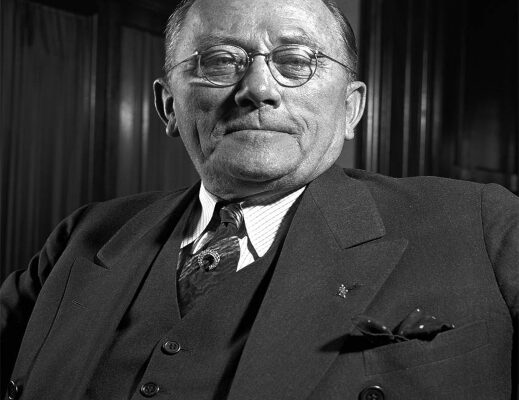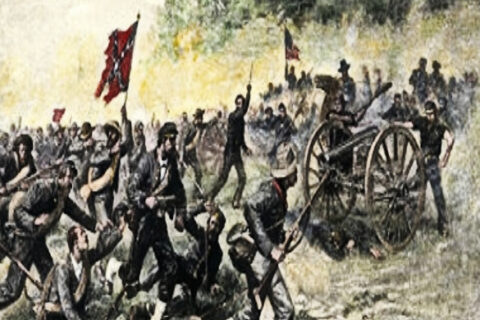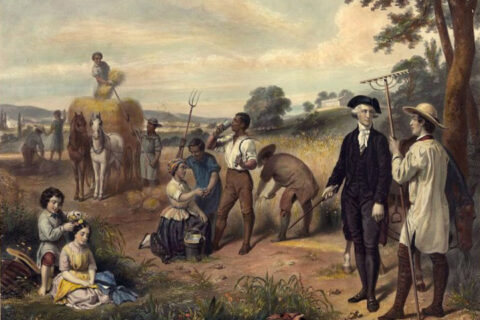Author’s Preface: The Jim Crow Era, in my view, was Dixie’s Golden Age and provided it with some of its best statesmen. An egregiously suppressed part of history, it remains our most loathed phase of our historiography, while easily being the one most lied about and used to condemn us. These largely forgotten yet maligned statesmen deserve their own recognition and, if ever possible, monuments to commemorate their actions in defense and support of their Southern constituents, heroes removed from public memory. This entry will begin this new series with one of the most infamous statesmen to ever grace Southern politics with his presence.
”…the ill-dressed, surly audience, unintelligent, and slinking. They were the sort of people that lynch Negroes, that mistake hoodlumism for wit, and cunning for intelligence, that attend revivals and fornicate in the bushes afterwards. They are undiluted Anglo-Saxons, the sovereign voter; and it was so horrible it seemed unreal.”
William Alexander Percy discussing lower class Whites in Mississippi
Boisterous and headstrong, yet standing at a meager 5’2,” Theodore Bilbo personified the ideological framework of the lowly Mississippi rural population, or rednecks. Regarded as nothing more than a race-baiting simpleton of a Southern demagogue, Bilbo’s true legacy reveals a man who, in reality, scoffed at such a label in his own life. Enacting numerous pieces of legislation for the poor folk and working diligently on their behalf as a state senator, governor, and U.S. Senator and wholeheartedly undeserved of the malicious defamation of his name within neo-abolitionist historiography. Bilbo’s platforms existed utterly devoid of appeals to racialist sentiments until the final few years of his nearly 40 yearlong public service tenure. This essay will detail the life, career, and legacy of Theodore Bilbo.
Theodore Gilmore Bilbo was born on October 13, 1877, in what is now Pearl River County. His formative years carried with them the greatest influence on his future political stances. Growing up poor in southeast Mississippi, Bilbo witnessed as the locals flooded into the timber industry and received a penance of payment for hard labor, only to be left indigent once again upon the total clearing out of the hardwood-pine forests and the leaving of the timber companies. Having grown up a “redneck,” he was all too aware of the abhorrent, downtrodden lives of rural White folk. His lifelong passion as a farmer served to keep him near to the conditions and people he represented.
Furthermore, Christianity was tantamount to his foundations. Being reared Baptist, Bilbo commonly cited the Bible and biblical teaching throughout his life. A talented orator from his youth, he would often preach sermons as a young man. His talents as a public speaker are arguably the most notable reason for his successes in elections.
Bilbo’s political career began in 1908 after being elected to the Mississippi State Senate during the midst of the increasing rural White populism flooding into the state’s Democratic Party. The history of such populism is for another essay, but Bilbo easily capitalized upon it. A populist himself hailing from the very demographic he sought to represent, he was elected to the state senate in 1908 and rose to the seat of lieutenant governor in 1912. His early political career was quite easy for him. Rural White populism, while partially strengthened within the state Democratic Party via the Constitution of 1890, would not truly wield real power as a faction of state politics until the adoption of White primaries in 1902, which replaced the old convention and caucus system, laying the perfect groundwork for Bilbo’s rise to power.
The Man, as he had so been nicknamed, soon found himself able to fully apply his Bilboism upon becoming governor in 1916. Able to utilize his oratory skills and personal sympathies, Bilbo ran his campaign from the stump. Traveling all over the state in White majority counties, Bilbo’s communication became legendary. His election dealt a massive blow to the whims and wills of the political elite which reigned from the Delta. As fate would have it, Bilbo’s first term as governor also marked his most successful term of all civil positions he held and would hold.
As governor, Bilbo kept his promises to his voters to the best of his ability. With reformists holding most of the state power at this time, Bilbo accomplished the creation of a state tax commission and the equalization of tax assessments, a board of bank examiners, a highway commission, a pardoning board, a tuberculosis hospital, a charity hospital, a training school for the unruly, a compulsory school-attendance law, a Blue Sky law, a stringent anti-lobby law, equalization of school fund distribution, adult night classes, and the most sizeable appropriation for education the state had seen at the time. However, the Delta conservatives, who still held significant sway in the state house of representatives, did prevent some of his proposed legislation from passing.
Bilbo’s first term as governor ended in 1920. He would not win a race again until 1928, beginning his second term in the same position. Little may be said of this political stint. The elite had regained control of both houses in the legislature and effectively neutered his power. Accomplishing nothing at this time, Bilbo’s next step would be his ascension to the United States Senate.
His federal career began in 1935 following his election to the U.S. Senate. An avid New Deal supporter, Bilbo stood behind each and every New Deal decision President Roosevelt made. Despite this, he was often unpopular for his more rugged nature and boisterous speaking. The true heights of his defamation in the media and the malignant attitude Congress held toward him did not fully develop until his second term. He even feuded greatly with his fellow Mississippi senator, an exceptionally powerful senator, Pat Harrison, a representative of the Delta and merely an individual battle among the greater war with Mississippi’s financial rulers. The argument may be made that Harrison began the feud. Regarding his views on his relationship with Harrison in a letter to a friend, Bilbo stated about his prestigious colleague, “He has not given me any more consideration since I have been in the Senate, except where he was forced to, than you would give the Negro servant in your home. He owns a nice home in Washington. He has been here for 26 years. He has had every opportunity to ingratiate himself with the social life of Washington, but he has been so afraid that I might gain some recognition that during all this time, both while I was working in the Department of Agriculture, and since I have been his colleague in the United States Senate, he has never invited me to share a meal with him in public and I have never even been invited to enter his home.”
By far the most integral aspect of Bilbo’s antics and philosophy constituted his intense rivalry with the genteel Mississippi Delta elite. That faction wholeheartedly loathed Bilbo. Each and every step he took as a politician was met with sanctimoniousness and malicious propaganda which they produced. Unfortunately for the proper Delta conservatives, Bilbo and his ilk existed as a perpetual thorn in their side due to their bluntly rapacious nature and arrogant condescension which they directed toward the majority of White folk who lived in Mississippi. No matter the lengths which they went to defame Bilbo via negative reporting and propaganda, they simply lacked the ability to dethrone him.
As a bit of a side note, Bilbo disliked Huey Long of Louisiana and had a short rivalry against him. Long appealed greatly to poor country citizenry and could potentially draw votes away from Bilbo towards any of the latter’s enemies if the former so desired. Additionally, Bilbo was an ardent New Dealer, and Long was not. Bilbo did not believe it was Long’s business meddling in Mississippi affairs. They exchanged some words and openly disliked each other, but it amounted to nothing more than that. This came to an end following Long’s assassination in 1935.
An additional addendum to address is The Man’s personal life. Besides his passion for politics, Bilbo adored farming. He owned a pecan farm and, when not politicking, typically spent his time on his farm. He was terrible with his money and often gained a large amount only to turn around and spend it all, never seeming to be bothered by it. One of his vices which negatively impacted his reputation throughout his life and arguably contributed to the slow degradation of his marriage was his weakness for women. He was known to be a bit of a womanizer and was often popular with the ladies. Lastly, he was a lifelong Baptist.
To address the elephant in the room of his nearly 40 yearlong political career and the only discussed aspect of his life’s legacy, Theodore Bilbo was not a race-baiting demagogue, contrary to the popular post-1960s narrative. His first instance of dabbling in the affairs of race politics took place in 1928 during the presidential election, and he only did so as a means of competing with the Delta leaders who did so first in the highly competitive election of that year. While he did show support for Negro repatriation to Africa, Bilbo remained shockingly quiet on racial discussions until the late 1930s, unlike the brunt of his Mississippi contemporaries. He was even so opposed to doing so that he, himself, claimed that he was the first governor of Mississippi since the end of Reconstruction to not win an election by leaning into the racial divide.
Racial politics again reared its head during the congressional push for the Costigan-Wagner anti-lynching bill and the reactionary filibuster it received in response from the Southern bloc. Arguably the loudest opponent of said bill was none other than Bilbo himself. He was reared in an area in which vigilante justice was often the norm, and the populace was usually far separated from the nearest form of law and order. Additionally, they were a people who generally disliked when outsiders meddled in their affairs. However, Bilbo, and his Southern contemporaries, primarily opposed the bill because it was a blatant attempt at federal overreach. According to constitutional law, it was the states’ domain to handle such crimes, not Washington D.C.’s.
As the non-Southern factions of the Democratic Party gravitated closer to the Left and progressively embraced the burgeoning Civil Rights movement in the early 1940s, Bilbo’s notoriety increased. It was primarily the period from 1942 to 1946 in which The Man gained his infamous status as a belligerent, acrimonious, race-baiting demagogue. It was at this point he finally sided with the Conservative Coalition in Congress. He longwindedly opposed numerous Civil Rights proposals during this time and was a mouthpiece for Southern opposition against the power of the Federal Employment Practice Committee in Dixie. He also led the opposition against the nomination of liberal social rights activist Aubrey Willis Williams to the head of the Rural Electrification Administration. Bilbo knew the levels of destruction and havoc such social revolutionary measures, particularly ones spearheaded by blatant communists, could have on Southern society, going so far as to author the pro-segregation book Take Your Choice: Separation or Mongrelization. Unfortunately, this tarnished his legacy, and though he did make the race issue the basis for his senatorial campaign in 1946, it may be safe to assume he preferred not to do so given his previous track record. It was a copout and an easy means of winning an election, but Bilbo foresaw the blighting the Civil Rights movement would have on a mostly peaceful social order. These few years, at the end of his life, are the only period of his life history remembers. Strangely, his last interview he gave on his deathbed, an interview he requested, was to the Negro newspaper Negro South.
Nothing positive is said of Bilbo in modern historiography. His legacy has effectively become the last four years of his life, despite the fact he did numerous great things for rural folk in Mississippi. Upon observing his life and career far deeper than Wikipedia or a college history class will delve, it becomes apparent Bilbo was a superlative statesman and endeavored to truly improve the lives of his supporters. Lamentably, this fact may never emerge within America today, leaving much of his legacy to be butchered by raving leftists in academia assuming they even broach the topic. The bronze statue of him at the state capital served for many years as nothing more than a coat rack for members of the Mississippi Black Caucus but now resides in storage as of 2021, a far cry from his funeral in 1947 which was attended by 5,000 mourners.
I am honestly against the social intermingling of Negroes and Whites. But, I hold nothing personal against Negroes as a race. God made them as they are and they should be proud of that God-given heritage as I am of mine.
Theodore Bilbo just before his death to reporter Leon Louis of the Negro South
Bibliography:
Morgan, Chester M. Redneck Liberal: Theodore G. Bilbo and the New Deal. Louisiana State University Press, 1985.
“The White people of the South are the greatest minority in this nation. They deserve consideration and understanding instead of the persecution of twisted propaganda.” –Strom Thurmond






Thank you for this series Mr. Wasp. I look forward to later installments.
Bilbo had many virtues; supporting Roosevelt’s Marxist New Deal was not among those virtues.
Always good to see you writing within your wheelhouse. No one does it better.